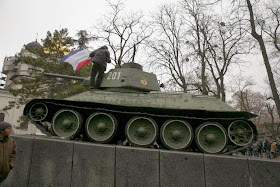by Benson Agoha
 Commenting on the current problems facing the Co-op Bank recently, James Ashton observed that what the Bank needed was a strong management. Mr. Ashton could not have said it simpler.
Commenting on the current problems facing the Co-op Bank recently, James Ashton observed that what the Bank needed was a strong management. Mr. Ashton could not have said it simpler.
Yet, `strong management' can be relative, especially when considering social dynamics and the 'human factor' aspect of managing.
It is not without reason that, of the resources available to an organisation, human resources continue to retain the `most-difficult-to-manage' title.
The point of Manchester United Football Club has become very interesting. Indeed, from the moment Sir Alex Ferguson named his successor, all eyes were on David Moyes. Will he, will he not? Could he, could he not?
Expectedly, the issue was rationalised and laid to rest after the argument that Moyes could not have been expected to win tropphies at Everton, where he was manager for 10 years.
What Moyes achievement at Everton included was sustaining their presence at the Premier League, but there has also been question of ambition. If he was there for so long, was he expecting and trying to win trophies or did some other underlying reason keep him there for so long?
It is my view that the recent suggestion or clamour that a mass offload of the players will produce positive changes next season is not true.
Actualy, I doubt this and on the contrary, do believe that if the statusquo remain unchanged at managerial level, rather than do better next season, United will continue to struggle, even with a flock of new players.
And it is neither because the players are weak nor that David Moyes is not good enough. The problem lies somewhere between. Here is why.
The majority of the players at Manchester United were signed on by Sir Alex Ferguson, including former Arsenal player Robin van Persie, who sustained his flame and performed under him, but has since tamed.
Spaniad and former dependable Chelsea player, Juan Mata was brought on by Moyes and performed in the first few matches, but he too appear to have cooled.
Notes to diagram:
a) As can be seen, the star represents the 'point of contact as wess as dependability'. It is the official interaction point at which the leader communicates with his subordinates.
b) The success of the group depends to a large extent on how well this interaction is executed.
c) Also it is worth mentioning that the slanting arrows show that both the leader and the subordinate are mutually dependable and interdependent. Neither can go it alone without the other.
The problem David Moyes faces at United is the same as any manager who has inherited, and is surrounded by several confident, equally high skilled professionals.
They know that the job can go on without you and often-times inwardly selfishly evaluate your performance, along the line of `I can do better than this one'. Let's see what makes him thick.
The problem is with how they perceive him, his style, his goals and ultimate ambition - after that, the players can blend in. It is in their interest so to do after playing together, successfully for so long.
On his part, David Moyes must prove to the players that, it was not just a favour that Sir Alex Ferguson did to him, but that he arrived to take charge in all its ramifications.
How a manager analyses the motivational needs of his surbordinates with a view to stoking it at the right time and letting it sag, if and when he must, provided it will not be a threat to overal output, is paramount.
It seems that, if he is not yet too late, David Moyes needs to develop and enforce a style of leadership that will make the team work for him, giving him the chance to earn or if necesary demand their respects.
Even Moses had to make the unavoidable declaration call - `Who Is On The Lord's Side?' This is why I argued that there is no humility in leadership. It is sometimes, a test of will - perhaps more often than not.
And to borrow a leaf from Desmond Morris, in times of need, the leader, or his surbordinates must be able to articulate workable solutions and be ready to subdue any form of insurrection.
Ego is often a set back to performance and despite his inate and material wealth, a surbordinate must be marginally 'stepped down' to accept whomoever is placed to play the role of a leader.
Chelsea is a ready example and people talk of Jose Morinho, under whom Chelsea has also suffered some embarrasing defeats. But Morinho maintains a posture that `no matter who you are, no matter what you have, no matter how we joke', I expect performance from you or else. Morinho achieved it because he has passed different tests.
But before Morinho, Rafael Benitez faced similar test during his interlude at Chelsea, so much that he had to confront the fans, telling them `you are not doing the club any favours'. The resulting change in behaviour was almost instantaneous. Benitez went ahead to win silverware at Euro level.
United need to see Moyes present and retain a posture of an ambitious, confident manager who has not come to relieve Sir Alex Ferguson, but to achieve results and make a name for himself.
And thank goodness, Sir Alex Ferguson is off after committing to Harvard Business School. So all those fans who still expect his return, will have to cultivate the right attitude and help David Moyes take the club back to that level they all so relish.
* Follow me on Twitter: @bensonagoha or @woolwichonline.
 Commenting on the current problems facing the Co-op Bank recently, James Ashton observed that what the Bank needed was a strong management. Mr. Ashton could not have said it simpler.
Commenting on the current problems facing the Co-op Bank recently, James Ashton observed that what the Bank needed was a strong management. Mr. Ashton could not have said it simpler.Yet, `strong management' can be relative, especially when considering social dynamics and the 'human factor' aspect of managing.
It is not without reason that, of the resources available to an organisation, human resources continue to retain the `most-difficult-to-manage' title.
The point of Manchester United Football Club has become very interesting. Indeed, from the moment Sir Alex Ferguson named his successor, all eyes were on David Moyes. Will he, will he not? Could he, could he not?
Expectedly, the issue was rationalised and laid to rest after the argument that Moyes could not have been expected to win tropphies at Everton, where he was manager for 10 years.
What Moyes achievement at Everton included was sustaining their presence at the Premier League, but there has also been question of ambition. If he was there for so long, was he expecting and trying to win trophies or did some other underlying reason keep him there for so long?
It is my view that the recent suggestion or clamour that a mass offload of the players will produce positive changes next season is not true.
Actualy, I doubt this and on the contrary, do believe that if the statusquo remain unchanged at managerial level, rather than do better next season, United will continue to struggle, even with a flock of new players.
And it is neither because the players are weak nor that David Moyes is not good enough. The problem lies somewhere between. Here is why.
The majority of the players at Manchester United were signed on by Sir Alex Ferguson, including former Arsenal player Robin van Persie, who sustained his flame and performed under him, but has since tamed.
Spaniad and former dependable Chelsea player, Juan Mata was brought on by Moyes and performed in the first few matches, but he too appear to have cooled.
Notes to diagram:
a) As can be seen, the star represents the 'point of contact as wess as dependability'. It is the official interaction point at which the leader communicates with his subordinates.
b) The success of the group depends to a large extent on how well this interaction is executed.
c) Also it is worth mentioning that the slanting arrows show that both the leader and the subordinate are mutually dependable and interdependent. Neither can go it alone without the other.
The problem David Moyes faces at United is the same as any manager who has inherited, and is surrounded by several confident, equally high skilled professionals.
They know that the job can go on without you and often-times inwardly selfishly evaluate your performance, along the line of `I can do better than this one'. Let's see what makes him thick.
The problem is with how they perceive him, his style, his goals and ultimate ambition - after that, the players can blend in. It is in their interest so to do after playing together, successfully for so long.
On his part, David Moyes must prove to the players that, it was not just a favour that Sir Alex Ferguson did to him, but that he arrived to take charge in all its ramifications.
How a manager analyses the motivational needs of his surbordinates with a view to stoking it at the right time and letting it sag, if and when he must, provided it will not be a threat to overal output, is paramount.
It seems that, if he is not yet too late, David Moyes needs to develop and enforce a style of leadership that will make the team work for him, giving him the chance to earn or if necesary demand their respects.
Even Moses had to make the unavoidable declaration call - `Who Is On The Lord's Side?' This is why I argued that there is no humility in leadership. It is sometimes, a test of will - perhaps more often than not.
And to borrow a leaf from Desmond Morris, in times of need, the leader, or his surbordinates must be able to articulate workable solutions and be ready to subdue any form of insurrection.
Ego is often a set back to performance and despite his inate and material wealth, a surbordinate must be marginally 'stepped down' to accept whomoever is placed to play the role of a leader.
Chelsea is a ready example and people talk of Jose Morinho, under whom Chelsea has also suffered some embarrasing defeats. But Morinho maintains a posture that `no matter who you are, no matter what you have, no matter how we joke', I expect performance from you or else. Morinho achieved it because he has passed different tests.
But before Morinho, Rafael Benitez faced similar test during his interlude at Chelsea, so much that he had to confront the fans, telling them `you are not doing the club any favours'. The resulting change in behaviour was almost instantaneous. Benitez went ahead to win silverware at Euro level.
United need to see Moyes present and retain a posture of an ambitious, confident manager who has not come to relieve Sir Alex Ferguson, but to achieve results and make a name for himself.
And thank goodness, Sir Alex Ferguson is off after committing to Harvard Business School. So all those fans who still expect his return, will have to cultivate the right attitude and help David Moyes take the club back to that level they all so relish.
* Follow me on Twitter: @bensonagoha or @woolwichonline.
















































































































































































No comments:
Post a Comment